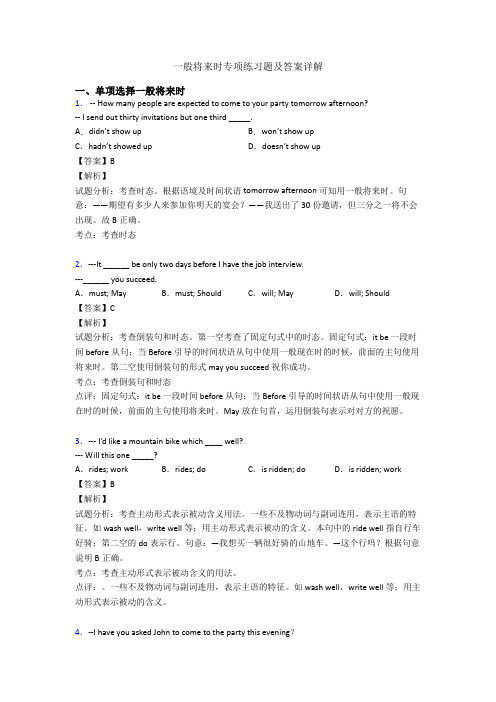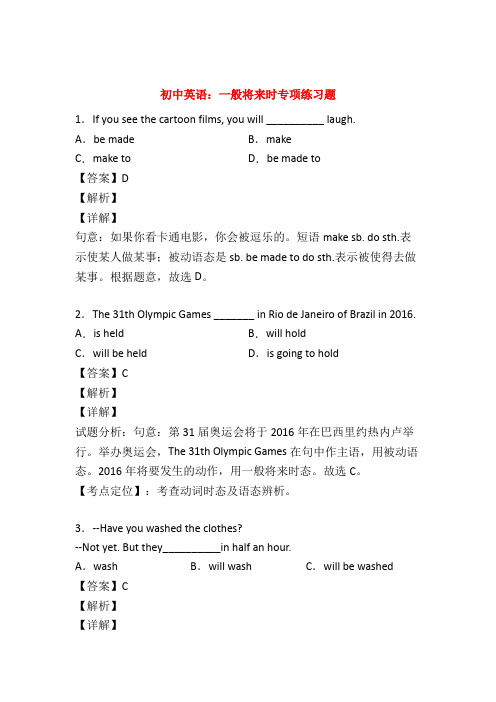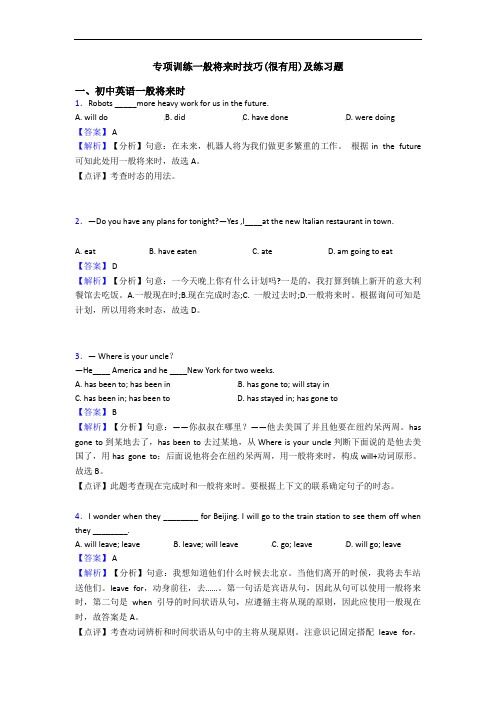一般将来时用法和专项练习
- 格式:doc
- 大小:38.50 KB
- 文档页数:7

初中英语:一般将来时专项练习题1.The number of the old people is increasing in China. With the development of China, they _____ better care of in the future.A.will take B.are taken C.will be taken D.are taking 【答案】C【解析】【详解】句意“中国老年人的数量正在增加,随着中国的发展,将来他们会被很好的照顾”。
根据in the future可知,用一般将来时,排除B和D,且老年人和照顾之间为被动关系,故选C。
2. Spoken English test for students ______ in 2018.A.hold B.holdsC.were held D.will be held【答案】D【解析】【详解】试题分析:句意:学生口语测试将在2018年举行。
根据句意及题干分析此题应用被动语态,其基本结构是be+动词的过去分词,根据时间状语in 2018可知要用一般将来时态的被动语态,故选D。
考点:考查被动语态的用法3.World Leisure Congress(世界休闲大会) in Pinggu next year. A.hold B.is held C.will hold D.will be held 【答案】D【解析】【详解】句意:世界休闲大会将于明年在平谷举办。
hold举行,举办,动词原形;is held一般现在时的被动语态;will hold一般将来时;will be held一般将来时的被动语态。
根据句中的时间状语next year可知,这句话表示将来的事情,应用一般将来时,故排除A和B;主语World Leisure Congress与动词构成被动关系,应用被动语态,故选D。
4.--- A new shopping mall ______ next year in our town.--- Really? It is wonderful! I needn’t go far away to buy things.A.is built B.has built C.will build D.will be built 【答案】D【解析】【详解】句意:——一家新的购物商场将于明年建在我们的家乡。

一般将来时专项练习题及答案详解一、单项选择一般将来时1. -- How many people are expected to come to your party tomorrow afternoon?-- I send out thirty invitations but one third _____.A.didn’t show up B.won’t show upC.hadn’t showed up D.doesn’t show up【答案】B【解析】试题分析:考查时态。
根据语境及时间状语tomorrow afternoon可知用一般将来时。
句意:——期望有多少人来参加你明天的宴会?——我送出了30份邀请,但三分之一将不会出现。
故B正确。
考点:考查时态2.“When he _____ is not known yet.” “But when he ____, he will be warmly welcomed.”A.comes, comes B.will come, will comeC.comes, will come D.will come, comes【答案】D【解析】试题分析:考查时态:第一个when引导的主语从句,用将来时,第二个when引导的时间状语从句,用一般现在时代替一般将来时,句意:他什么时候来还不知道。
但当他回来时,他会收到热烈的欢迎。
选D。
考点:考查时态语态点评:时间条件状语从句的时态不能用一般将来时,而用一般现在时代替,考查时态还要注意语态。
3.However hard he tries,the recorder .A.didn’t work B.won’t work C.isn’t working D.hasn’t work ed【答案】B【解析】试题分析:考查will用法。
句意:无论他多么努力尝试,这个录音机就不工作了。
本题中的will表示的是一种倾向性,如The door won’t open.故B正确。

一般将来时专项练习题及答案详解一、单项选择一般将来时1. -- How many people are expected to come to your party tomorrow afternoon?-- I send out thirty invitations but one third _____.A.didn’t show up B.won’t show upC.hadn’t showed up D.doesn’t show up【答案】B【解析】试题分析:考查时态。
根据语境及时间状语tomorrow afternoon可知用一般将来时。
句意:——期望有多少人来参加你明天的宴会?——我送出了30份邀请,但三分之一将不会出现。
故B正确。
考点:考查时态2.---It ______ be only two days before I have the job interview.---______ you succeed.A.must; May B.must; Should C.will; May D.will; Should【答案】C【解析】试题分析:考查倒装句和时态。
第一空考查了固定句式中的时态。
固定句式:it be 一段时间 before从句;当Before引导的时间状语从句中使用一般现在时的时候,前面的主句使用将来时。
第二空使用倒装句的形式may you succeed祝你成功。
考点:考查倒装句和时态点评:固定句式:it be 一段时间 before从句;当Before引导的时间状语从句中使用一般现在时的时候,前面的主句使用将来时。
May放在句首,运用倒装句表示对对方的祝愿。
3.--- I’d like a mountain bike which ____ well?--- Will this one _____?A.rides; work B.rides; do C.is ridden; do D.is ridden; work【答案】B【解析】试题分析:考查主动形式表示被动含义用法。

初中英语:一般将来时专项练习题1.If you see the cartoon films, you will __________ laugh.A.be made B.makeC.make to D.be made to【答案】D【解析】【详解】句意:如果你看卡通电影,你会被逗乐的。
短语make sb. do sth.表示使某人做某事;被动语态是sb. be made to do sth.表示被使得去做某事。
根据题意,故选D。
2.The 31th Olympic Games _______ in Rio de Janeiro of Brazil in 2016. A.is held B.will holdC.will be held D.is going to hold【答案】C【解析】【详解】试题分析:句意:第31届奥运会将于2016年在巴西里约热内卢举行。
举办奥运会,The 31th Olympic Games在句中作主语,用被动语态。
2016年将要发生的动作,用一般将来时态。
故选C。
【考点定位】:考查动词时态及语态辨析。
3.--Have you washed the clothes?--Not yet. But they__________in half an hour.A.wash B.will wash C.will be washed 【答案】C【解析】【详解】句意:——你洗衣服了吗?——还没有。
但是它们将在半小时之后被洗。
考查动词的被动语态。
wash动词原形;will wash一般将来时态形式;will be washed一般将来时态的被动语态形式。
联系上下语境并结合此句用的是现在完成时态,可知衣服还没有洗。
根据短语in half an hour,in+时间段,用在一般将来时中,意为“在…之后”,主语是“they”指的是衣服,所以此处应用一般将来时的被动语态,表示衣服将被洗。
一般将来时的被动语态构成是will+be+动词的过去分词,此空应填will be washed,故选C。

初中英语:一般将来时专项练习题1.The 24th Winter Olympics in China in 2022.A.hold B.will hold C.are held D.will be held 【答案】D【解析】【详解】句意:第24届冬奥会将于2022年在中国举行。
考查被动语态。
in 2022是将来的时间,用于一般将来时,需借助will构成,可排除AC 选项。
主语The 24 Winter Olympics是动词held的受动者,需用被动语态,可排除B项。
根据句意结构,可知选D。
2.He has ordered a watch on line for his father and it _______ to him before Father’s Day.A.send B.will be sent C.was sent D.sent【答案】B【解析】【详解】试题分析:句意:他在网上为父亲订了一块表。
将在父亲节前寄给他。
It指代的是“表”,作主语,与谓语动词send是逻辑上的动宾关系,it是其承受者,用被动语态;从时态上看,表将在父亲节前寄给他,用一般将来时态,故选B。
考点:考查动词时态及语态辨析。
3.The School Art Festival_____ next month. You'd better prepare a talent show.A.holds B.is held C.will hold D.will be held 【答案】D【解析】【详解】句意:学校艺术节在下个月举办,你最好准备一个才艺展示。
考查一般将来时的被动语态。
holds一般现在时;is held一般现在时的被动语态;will hold一般将来时;will be held一般将来时的被动语态。
根据句中的时间状语“next month”可知,本句时态为一般将来时,再根据句意可知,主语“The School Art Festival”和谓语hold为逻辑上的动宾关系,应用被动语态。

专项训练一般将来时技巧(很有用)及练习题一、初中英语一般将来时1.Robots _____more heavy work for us in the future.A. will doB. didC. have doneD. were doing【答案】 A【解析】【分析】句意:在未来,机器人将为我们做更多繁重的工作。
根据in the future 可知此处用一般将来时,故选A。
【点评】考查时态的用法。
2.—Do you have any plans for tonight?—Yes ,I____at the new Italian restaurant in town.A. eatB. have eatenC. ateD. am going to eat【答案】 D【解析】【分析】句意:一今天晚上你有什么计划吗?一是的,我打算到镇上新开的意大利餐馆去吃饭。
A.一般现在时;B.现在完成时态;C. 一般过去时;D.一般将来时。
根据询问可知是计划,所以用将来时态,故选D。
3.— Where is your uncle?—He____ America and he ____New York for two weeks.A. has been to; has been inB. has gone to; will stay inC. has been in; has been toD. has stayed in; has gone to【答案】 B【解析】【分析】句意:——你叔叔在哪里?——他去美国了并且他要在纽约呆两周。
has gone to到某地去了,has been to去过某地,从Where is your uncle判断下面说的是他去美国了,用has gone to;后面说他将会在纽约呆两周,用一般将来时,构成will+动词原形。
故选B。
【点评】此题考查现在完成时和一般将来时。
要根据上下文的联系确定句子的时态。
初中英语:一般将来时专项练习题1.【2017·湖北襄阳·37】The 24th Winter Olympic Games ________ in Beijing and Zhangjiakou in 2022,from February 4th to 20th.A.is going to hold B.hold C.will be heldD.was held【答案】C【解析】【详解】句意:第24届冬季奥运会将在2022年2月4日到20日在北京和张家口举行。
is going to hold将要举行;hold举行,动词原形;will be held将要被举行,一般将来时的被动语态;was held一般过去时被动语态。
根据句意可知,主语The 24th Winter Olympic Games和谓语动词hold构成被动关系,应使用被动语态,再由句中的时间状语in 2022, from February 4th to 20th可知,这是一个将来的时间,应用一般将来时,故选C。
2.Don’t waste time any more. Wang Jun __________to be the mo nitor yesterday.A.chooses B.is chosenC.chose D.was chosen【答案】D【解析】【详解】试题分析:句意:不要浪费时间了。
王军昨天已经被选为班长了。
主语和谓语动词之间是动宾关系,所以用被动结构,根据时间yesterday可知用过去时态,故选D。
考点:考查被动语态的时态的用法。
3.Some new schools in Nanjing in the near future, which satisfies the citizens'needs for more resources.A.were built B.are built C.will build D.will be built 【答案】D【解析】【详解】句意:在不久的将来,南京将新建一些学校,这将满足市民对更多资源的需求。
一般将来时与将来进行时练习题及答案一、将下列动词转换成一般将来时1. We ________ (meet) at the park tomorrow.2. She ________ (travel) to Japan next week.3. They ________ (start) their new job in September.4. He ________ (buy) a new car next month.5. I ________ (visit) my grandparents during the holiday.6. The concert ________ (take) place at 8 PM.7. The company ________ (launch) a new product next year.8. They ________ (move) to a bigger house in the future.9. We ________ (have) a party on Saturday.10. He ________ (learn) how to play the piano soon.答案:1. will meet2. will travel3. will start4. will buy5. will visit6. will take8. will move9. will have10. will learn二、将下列动词转换成将来进行时1. This time tomorrow, I ________ (study) for my exam.2. At 9 PM tonight, she ________ (watch) a movie with her friends.3. By this time next month, they ________ (work) in a different city.4. At this time next year, he ________ (live) in a new apartment.5. In the future, we ________ (travel) around the world.6. I ________ (wait) for you at the airport this time next week.7. By the end of the day, she ________ (complete) her project.8. At this time tomorrow, they ________ (attend) a conference.9. He ________ (practice) the guitar every day from now on.10. We ________ (be) studying for the exam this time next week.答案:1. will be studying2. will be watching3. will be working5. will be traveling6. will be waiting7. will be completing8. will be attending9. will be practicing10. will be studying本文介绍了一般将来时和将来进行时的练习题及答案。
初中英语:一般将来时专项练习题1.It's reported that Jiangsu Grand Theatre ________ in September next year.A.completesB.is completedC.will completeD.will be completed【答案】D【解析】【详解】句意:据报道,江苏大剧院将于明年九月竣工。
考查被动语态。
next year明年,用于一般将来时,需用will+原形动词结构,可排除AB选项。
从句主语Jiangsu Grand Theatre是动词complete的受动者,需用被动语态,即“be+过去分词”结构,可排除C。
根据句意结构,可知选D。
2.It is reported that a space station ______ on the moon in a few years. A.was built B.will be builtC.is built D.has been built【答案】B【解析】【详解】试题分析:句意:据报道,几年后月球上将要建空间站。
表示几年后将要发生的动作,用一般将来时态,主语space station是谓语动词build的承受者,用被动语态。
故选B。
考点:考查动词的时态、语态辨析。
3.The posters will __________ from the classroom wall during the testweek.A.remove B.being removed. C.be removed.D.have removed【答案】C【解析】【详解】句意:考试周期间,海报将从教室的墙上取下。
本题考查语态。
remove除去,取下,是主动形式;being removed 正在被取下,是现在分词的被动形式;be removed是动词原形的被动形式;have removed是现在完成时的主动形式。
专项训练一般将来时专项练习题及答案详解一、初中英语一般将来时1.—I wonder if you for a picnic tomorrow.—If it ,I will go.A. go, not rainB. go, doesn't rainC. will go, isn't rain.D. will go, doesn't rain.【答案】 D【解析】【分析】句意:--我想知道明天你是否去野餐。
--如果天不下雨,我就去。
分析:第一个句子为宾语从句,主句为一般现在时,从句用原来的时态;第二个句子为条件状语从句,体现主将从现的原则,主语是第三人称单数,因此助动词用does.故选D【点评】考查动词的用法。
2.I’m so lucky because I see more cartoon characters next month.A. is able toB. will be able toC. be able toD. was able to【答案】B【解析】【分析】句意:我真幸运因为我下个月能看到更多的卡通人物。
next month表将来,因此用will be able to。
故选B。
【点评】考查一般将来时。
3.—Excuse me,could you please tell me if the meeting ________ on time?—If it ________ tomorrow,we'll have to put it off.A. will hold; snowsB. will be held; snowsC. will be held; snowD. holds; will snow 【答案】B【解析】【分析】句意:—打扰了,请你告诉我会议是否准时举行好吗?—如果明天下雪,我们只好推迟了。
第一个if引导的是宾语从句,表示将来会发生的事,用will表将来,hold the sports meeting 举办运动会。
一般将来时用法及专项练习一、一般将来时的动词形式一般将来时表示将来某个时间将要发生的动作或存在的状态,也表示将来经常或反复发生的动作。
一般将来时由助动词shall或will加动词原形构成,shall 用于第一人称,will用于第二、三人称。
但是现在第一人称一般也用will,其区别并不明显。
(或“be going to + 动词原形)常与tomorrow, next… , in (the)future,soon, in five days,in two weeks等连用。
如: I shall not come if it rains tomorrow. 如明天下雨我就不来。
My father will leave for China next week. 我的爸爸下星期要到中国去。
“I’ll, You’ll, He’ll , She’ll , It’ll, We’ll , They’ll …”是简缩形式。
二.一般将来时的句型1.肯定句:主语+shall /will+动词+其他成份The workers will build a new school here next year.工人们明年将在这儿盖一所新学校。
They will go shopping this afternoon. 今天下午他们将要去购物。
We shall have a delicious dinner tonight. 今晚我们将美餐一顿。
We shall be there before dark. 我们天黑前会到达那里。
2.否定句:主语+shall /will+not+动词+其他成份She won’t come back this week.这一周她不回来了。
I will not go shopping one hour later. 一小时之后我不会去购物。
He won’t play football with you before he finishes his work.他干完活后才能跟你踢足球。
3.疑问句:shall /will+主语+动词+其他成份Will you be back in ten minutes? 十分钟后你会回来吗?Will you please open the window? 请你打开窗户好吗?Shall we get something hot to drink? 我们喝一些热饮怎么样?4.特殊疑问句:特殊疑问词+shall /will+主语+动词+其他成份Where will you go next week? 下星期你去哪?What sall I do?我怎么办呢?How many books will they get? 他们将有多少本书?三.will, be going to …, be to…, be about to…的区别1.be going to +不定式,表示将来。
表示打算、准备做的事或即将发生或肯定要发生的事。
be going to和will相比,be going to通常表示主观,will通常表示客观。
What are you going to do tomorrow? 明天你要做什么?Look at the dark clouds, there is going to be a storm. 看看这些黑云,将有一场暴风雨。
It’s going to be a fine day tomorrow.明天将会是个好天。
It is going to rain. 要下雨了。
2.“be t o+动词原形”表示按计划要发生的事或征求对方意见。
这种结构表示计划中约定的或按职责、义务要求必须去做的事或即将发生的动作。
We are to have a meeting next Saturday. 下个周日我们有个会。
The boy is to go to school tomorrow. 这个男孩明天要去上学。
Are we to go on with this work? 我们继续干吗?The president is to visit China next week.总统下周来访中国。
3.“be about to+动词原形”表示即将发生的动作,意为:很快,马上。
后面一般不跟时间状语。
这一结构用于表示客观就要发生的事,表示马上就要发生。
一般不再与时间状语连用。
Don’t go out. We’re about to have a meeting. 别出去了,我们很快就开会了。
I was about to start when it began to rain.我刚要出发就下起雨来了。
He is about to leave for Shenyang.他将要离开去沈阳。
We are about to leave. 我们马上就走。
The film is about to begin. 电影马上就要开始了。
四.注意事项1. be about to 不能与tomorrow, next week 等表示明确将来时的时间状语连用。
2. Let’s …的附加疑问通常使用“…, shall we ?”。
Let’s have a rest, shall we?3. 问句是“Shall…?”,答句就用“shall ~”;问句用“Will …?”,答句就用“will ~ ”。
要前后保持一致。
Shall you go to school next week ?Yes, I shall . We’ll have an exam .Will you have an exam tomorrow?Yes, I will. / No, I won’t.一般将来时专项练习一、单项选择。
( ) 1. There __________ a meeting tomorrow afternoon.A. will be going toB. will going to beC. is going to beD. will go to be( ) 2. Charlie ________ here next month.A. isn’t workingB. doesn’t workingC. isn’t going to workingD. won’t work( ) 3. He ________ very busy this week, he ________ free next week.A. will be; isB. is; isC. will be; will beD. is; will be( ) 4. There ________ a dolphin show in the zoo tomorrow evening.A. wasB. is going to haveC. will haveD. is going to be( ) 5. –________ you ________ free tomorrow?–No. I ________ free the day after tomorrow.A. Are; going to; willB. Are; going to be; willC. Are; going to; will beD. Are; going to be; will be( ) 6. Mother ________ me a nice present on my next birthday.A. will givesB. will giveC. givesD. give( ) 7. –Shall I buy a cup of tea for you?–________. (不,不要。
)A. No, you won’t.B. No, you aren’t.C. No, please don’t.D. No, please.( ) 8. –Where is the morning paper?–I ________ if for you at once.A. getB. am gettingC. to getD. will get( ) 9. ________ a concert next Saturday?A. There will beB. Will there beC. There can beD. There are( ) 10. If they come, we ________ a meeting.A. haveB. will haveC. hadD. would have( ) 11. He ________ her a beautiful hat on her next birthday.A. givesB. gaveC. will givingD. is going to giving( ) 12. He ________ to us as soon as he gets there.A. writesB. has writtenC. will writeD. wrote( ) 13. He ________ in three days.A. coming backB. came backC. will come backD. is going to coming back( ) 14. If it ________ tomorrow, we’ll go roller-skating.A. isn’t rainB. won’t rainC. doesn’t rainD. doesn’t fine( ) 15. –Will his parents go to see the Terra Cotta Warriors tomorrow?–No, ________ (不去).A. they willn’t.B. they won’t.C. they aren’t.D. they don’t.( ) 16. Who ________ we ________ swimming with tomorrow afternoon?A. will; goB. do; goC. will; goingD. shall; go( ) 17. We ________ the work this way next time.A. doB. will doC. going to doD. will doing( ) 18. Tomorrow he ________ a kite in the open air first, and then ________ boating in the park.A. will fly; will goB. will fly; goesC. is going to fly; will goesD. flies; will go( ) 19. The day after tomorrow they ________ a volleyball match.A. will watchingB. watchesC. is watchingD. is going to watch( ) 20. There ________ a birthday party this Sunday.A. shall beB. will beC. shall going to beD. will going to be( ) 21. They ________ an English evening next Sunday.A. are havingB. are going to haveC. will havingD. is going to have( ) 22. ________ you ________ free next Sunday?A. Will; areB. Will; beC. Do; beD. Are; be( ) 23. He ________ there at ten tomorrow morning.A. willB. isC. will beD. be( ) 24. ________ your brother ________ a magazine from the library?A. Are; going to borrowB. Is; going to borrowC. Will; borrowsD. Are; going to borrows( ) 25. –Shall I come again tomorrow afternoon?–________ (好的).A. Yes, pleaseB. Yes, you will.C. No, please.D. No, you won’t.( ) 26. It ________ the year of the horse next year.A. is going to beB. is going toC. will beD. will is( ) 27. ________ open the window?A. Will you pleaseB. Please will youC. You pleaseD. Do you( ) 28. –Let’s go out to play football, shall we?–OK. I ________.A. will comingB. be going to comeC. comeD. am coming( ) 29. It ________ us a long time to learn English well.A. takesB. will takeC. spendsD. will spend( ) 30. The train ________ at 11.A. going to arriveB. will be arriveC. is going toD. is arriving二、动词填空。